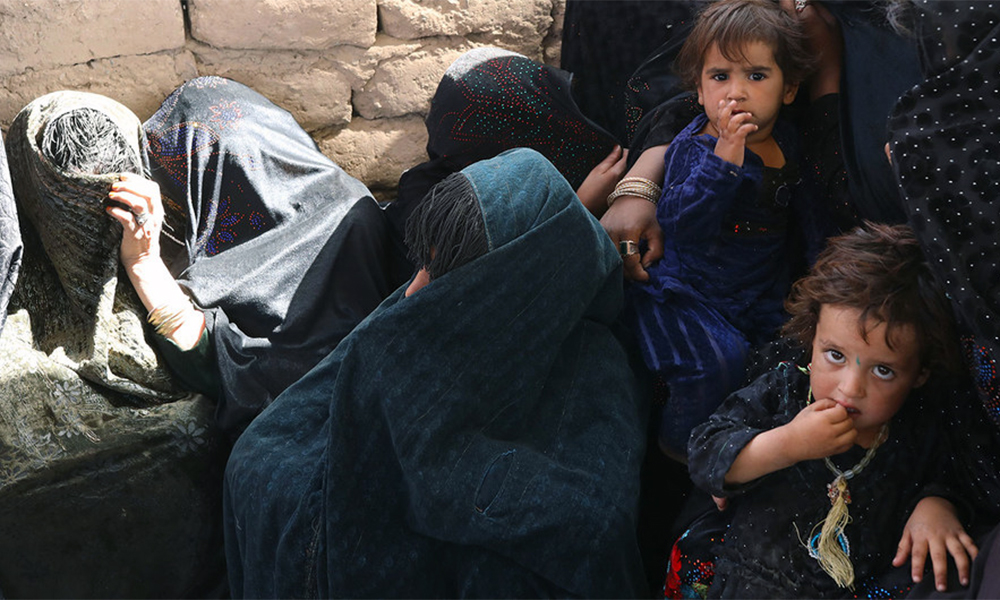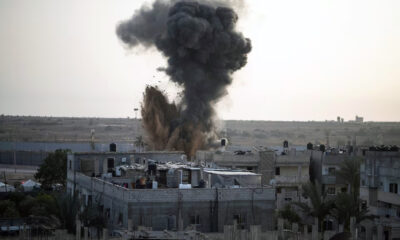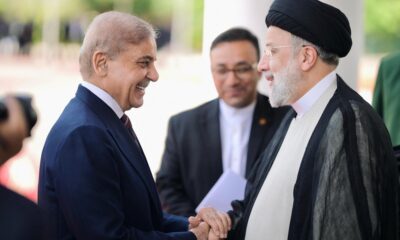Latest News
Afghanistan on ‘countdown to catastrophe’ as winter looms

The combined shocks of drought, conflict, COVID-19 and an economic crisis in Afghanistan, have left more than half the population facing a record level of acute hunger, according to a new UN assessment published on Monday.
The latest Integrated Food Security Phase Classification (IPC) report co-led by the Food and Agriculture Organization (FAO) and World Food Programme (WFP), revealed that the lives, livelihoods and access to food for 22.8 million people will be severely impacted.
“It is urgent that we act efficiently and effectively to speed up and scale up our delivery in Afghanistan before winter cuts off a large part of the country, with millions of people – including farmers, women, young children and the elderly – going hungry in the freezing winter”, said FAO Director-General QU Dongyu. “It is a matter of life or death”.
According to the report, more than one-in-two Afghans will face Phase 3 crisis or Phase 4 emergency levels of acute food insecurity from November through to March (winter) and will require an urgent international response to prevent a humanitarian catastrophe.
“We cannot wait and see humanitarian disasters unfolding in front of us – it is unacceptable”, he added.
This is the highest number of acutely food insecure people ever recorded by the UN, during 10 years of conducting IPC analyses in Afghanistan.
And globally, the country is home to one of the largest number of people facing acute hunger.
“Hunger is rising and children are dying”, said WFP Executive Director David Beasley.
“We can’t feed people on promises – funding commitments must turn into hard cash, and the international community must come together to address this crisis, which is fast spinning out of control”.
Among those at risk are 3.2 million children under five, who are expected to suffer from acute malnutrition by the end of the year.
Last month, WFP and the UN Children’s Fund (UNICEF) warned that without immediate life-saving treatment, one million children risked dying from severe acute malnutrition.
And for the first time, urban residents are suffering from food insecurity at similar rates to rural communities.
“Afghanistan is now among the world’s worst humanitarian crises – if not the worst – and food security has all but collapsed”, said the WFP chief.
“This winter, millions of Afghans will be forced to choose between migration and starvation unless we can step up our life-saving assistance, and unless the economy can be resuscitated”.
To meet rising needs, the UN will need to mobilize resources at unprecedented levels, yet the UN’s Humanitarian Response Plan remains only a third funded.
“We are on a countdown to catastrophe and if we don’t act now, we will have a total disaster on our hands”, Beasley said.
Latest News
Afghanistan now a ‘nexus for diplomatic endeavors’, says IEA

In the wake of dozens of meetings between high-ranking Islamic Emirate officials and visiting officials from foreign countries, and other diplomatic advances, the IEA said on Thursday that in the current geopolitical landscape, Kabul now “serves as a nexus for diplomatic endeavors and political deliberations pertaining to global affairs”.
In a series of posts on X, the IEA’s spokesman Zabihullah Mujahid said diplomatic missions and political delegations from various nations, including Russia, Malaysia, Kazakhstan, Turkmenistan, the European Union, and others, “are evident in the capital, highlighting its strategic importance in fostering Islamic cooperation”.
He said: “Recently, the honorable Minister of Transport of the Islamic Emirate, Mr. Hamidullah Akhundzada, led a significant delegation to Termez, Uzbekistan, for essential discussions aimed at enhancing bilateral relations.
“These discussions encompass a wide range of topics, from trade facilitation to security assurances, indicating a focused effort by the Islamic Emirate to strengthen and broaden its international engagements, thereby ensuring sustained development and stability.
“These initiatives, characterized by diligence and effectiveness, underscore Afghanistan’s enduring commitment to diplomatic engagement and its pivotal role in regional and global affairs,” he said.
Mujahid added that these initiatives “also emphasize the vital connection between diplomatic efforts and economic prosperity, promising favorable outcomes for Afghanistan’s socio-economic landscape.”
He pointed out that despite ongoing challenges, Afghanistan “remains steadfast in its pursuit of prosperity and resilience, defying pessimistic projections and charting a course towards political and economic renewal.”
He said: “Continued efforts are essential to fostering inclusive growth and impactful initiatives, thus advancing Afghanistan’s journey towards sustainable development and increased influence on the global stage.”
Latest News
Mullah Baradar discusses creation of railway with Kazakh deputy PM

Mullah Abdul Ghani Baradar, deputy prime minister for economic affairs has met with Erik Zhumangarin, the Deputy Prime Minister of Kazakhstan, and discussed the establishment of a railway network from Kazakhstan to Pakistan through Turkmenistan and Afghanistan, the deputy PM’s office said in a statement.
During the meeting, Baradar emphasized the need to sign agreements to solve the banking problems of traders from both countries, the creation of Afghan-Kazakh joint companies, and the facilitation of visas for Afghan traders.
According to the statement, the Deputy Prime Minister of Kazakhstan said that the Kazakh government intends to establish a joint chamber of industry and commerce and a joint trade and labor group between the two countries, and is ready to cooperate with Afghanistan in the sectors of e-governance, industry, higher education, education, health, and banking.
Latest News
Iran, Pakistan leaders raise concerns over ‘terrorist groups’ in Afghanistan

Following a two-day official visit to Pakistan, Iranian President Ebrahim Raisi and Pakistan’s Prime Minister Shehbaz Sharif issued a joint statement emphasizing the need to further expand commercial and economic cooperation and transform the common border of the two countries from a “border of peace” to “border of prosperity”.
The two leaders also strongly condemned aggressions and crimes of Israel in Gaza, and demanded an immediate and unconditional ceasefire, as well as unimpeded humanitarian access to the besieged people of Gaza.
Numerous other issues were also discussed but on the topic of Afghanistan, they jointly declared their commitment to the development of Afghanistan as a peaceful, united, independent country free from the threats of terrorism and drug trafficking.
According to the statement the two countries pointed out that the existence of terrorist organizations in Afghanistan is a serious threat to the security of the region and the world.
The two sides stressed their desire to strengthen cooperation in the field of fighting terrorism and ensuring security and creating a united front against terrorism.
They also discussed the importance of coordinating regional and international efforts to ensure security and stability in the region.
“While respecting the sovereignty and territorial integrity of Afghanistan, the two sides recognized that increasing participation of all strata of Afghans in basic decision-making will lead to the strengthening of peace and stability in this country,” the statement read.
-

 Sport5 days ago
Sport5 days agoAfghanistan Champions League kicks off with grand opening ceremony
-

 Latest News4 days ago
Latest News4 days agoPakistan’s frontiers minister stresses ‘dignified’ return of Afghan refugees
-

 Latest News5 days ago
Latest News5 days agoMore than 800 Afghan refugees deported from Pakistan in two days
-

 Regional3 days ago
Regional3 days agoIranian president lands in Pakistan for three-day visit to mend ties
-

 Climate Change4 days ago
Climate Change4 days agoMassive river flooding expected in China, threatening millions
-

 Latest News4 days ago
Latest News4 days agoChinese keen to invest in Panjshir-Kabul water conduit project
-

 World4 days ago
World4 days agoTwo Japan navy helicopters crash, one body found, 7 missing
-

 Sport3 days ago
Sport3 days agoKolkata beat Bengaluru by one run in IPL as Kohli fumes at dismissal
























